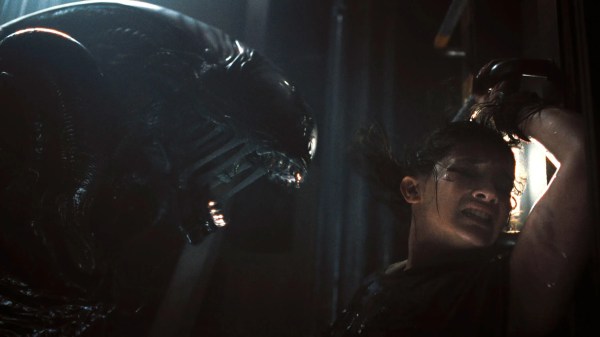During the Republic’s late period, the Romans found themselves ruled by corrupt, out-of-touch elites who ignored the struggles of the downtrodden, allowing ambitious men to violently mobilize the masses to gain power for themselves.
Ring a bell? According to Francis Ford Coppola, the 85-year-old legendary filmmaker behind unimpeachable masterpieces such as The Godfather and underappreciated gems like One from the Heart, it should.
“Our American republic is not all that different from Old Rome,” Laurence Fishburne authoritatively narrates in the opening minute of Megalopolis, Coppola’s latest feature after a 13-year semi-hiatus. The self-described fable, released theatrically last weekend, hinges entirely on that hypothesis.
In the film, modern New York City is New Rome, a declining metropolis steered by an uninspired, decadent oligarchy partying in drug-fueled discos and hosting gaudy bread and circuses in Madison Square Garden as the poor protest drearily outside. New Rome’s elite, led by Mayor Franklyn Cicero (Giancarlo Esposito), face a singular foil in Cesar Catilina (Adam Driver), an innovative, time-altering architect who dreams of transforming the city into a futuristic utopia of his design, Megalopolis, using his newfangled dynamic metallic substance, Megalon. Things get complicated when Mayor Cicero’s daughter, Julia (Nathalie Emmanuel), allies with Catilina, setting in motion a chain of events complete with a gold-digging infotainment anchor (Aubrey Plaza), a virginal teen pop sensation (Grace VanderWaal), and a wannabe fascistic demagogue (Shia LaBeouf).
Through this vast, occasionally confusing story, Megalopolis attempts to be many things: a love story, a sci-fi epic, a bureaucratic drama, a biting satire, a psychological profile, a gripping mystery, and, to some extent, a philosophical treatise. But beyond all that, it’s Coppola’s political manifesto, a personal statement he has allegedly worked on since its initial conception in the late 1970s, spending approximately $120 million since. From the film’s get-go, the director’s message to viewers is clear as day: If Americans do not break free from their bad managers and their bad manners, then the republic as we know it will crumble at the hands of nefarious leaders—just like nations and empires before.
Coppola, who also wrote the film, sincerely believes in Megalopolis’ central idea. At this year’s Cannes Film Festival, he told the assembled press, “What’s happening in America … is exactly how Rome lost their republic thousands of years ago.” Megalopolis, he hopes, will kickstart the vanguard of those who will lead America past its struggles into a better tomorrow. “My dream … is that the artists of our country who are going to, in their work, shine light on what’s going on and allow the people to see it, because you can’t act upon it if you can’t see it.”
Too bad the only dramatic movement Megalopolis would convincingly inspire is for the audience to flee the theater by the movie’s halfway mark. Rather than fill his passion project, which he has spent nearly half a century and a fortune on, with concrete ideals, Coppola instead grasps at straws. He puts together a hodgepodge of vague Roman allusions that result in an unintentionally comical presentation of relevant political themes.
As the main characters’ names (Cesar Catilina, Franklyn Cicero, etc.) suggest, Megalopolis is an attempted modern retelling of 63 B.C.’s Catilinarian conspiracy, when Catiline, a Roman senator, plotted to violently overthrow Cicero from his consulship. Cicero eventually discovered the plot and denounced Catiline, who fled from Rome and eventually died in battle. Catiline’s try for power arguably expedited the Republic’s collapse, an event that one could imagine provided Coppola with an abundance of material.

However, while Coppola may attempt to tell this tale, it is rife with either historical illiteracy or a bungled role reversal. Megalopolis’ Catiline equivalent, Catilina, is the film’s hero, a man trying to peacefully progress his society, not an immoral traitor who planned bloodshed for his personal gain. Coppola’s Cicero, on the other hand, is the chief villain throughout the majority of the film contently presiding over New Rome’s decline, not the brilliant statesman whose ideas laid the groundwork for the Renaissance and the Enlightenment centuries later. Whatever Coppola’s indecipherable intentions are here, he fails to convincingly tie these characters to any current counterparts, leaving moviegoers scratching their heads as to exactly how he sees America reflecting Rome.
If Coppola is not trying to offer an exact comparison between the two global superpowers, he is instead throwing every Roman-coded reference at the silver screen and seeing what current phenomenon he can stick them to. Q: Gladiator fights? A: WWE. Q: Vestal Virgins? A: Purity ring-adorned pop stars. Q: Scandalous Roman gossip? A: Sleazy tabloid reporters. Q: Überoyal legions of followers willing to commit violence for their favorite leaders. A: Well, you know that answer. Q: Does this approach provide any sense of historical continuity or structure? A: No. From this, Coppola’s core message is muddled, if not lost entirely.
This trend of making incomplete cherry-picked historical parallels to advance the provocative and premature “the American experiment is dead” talking point has emerged in other mediums. British historian Niall Ferguson’s debut Free Press article in June, “We’re All Soviets Now,” argued that resemblances between 2020s U.S. and ’80s U.S.S.R. in infant mortality, economic stagnation, and other fields somehow meant America was on track to unrecoverable defeat in the new Cold War against China. Understandably, higher powers (e.g., Jonah Goldberg) deftly pushed back on Ferguson’s argument.
But perhaps Coppola’s worst offense is how he insults viewers’ intelligence. Released just over a month before Election Day, Megalopolis is not without direct references to this exact political moment. However, instead of letting viewers do the heavy lifting in figuring out what represents who, Coppola awkwardly soaks the film in clumsy imitation. Angered citizens fly red MAKE ROME GREAT AGAIN (MaRGA?) flags as they storm Madison Square Garden. Later on, a character jumps onto a swastika tree stump as his supporters rally. To top off his parable that teaches us that only a magical builder can save us from ourselves, Coppola leaves a parting message: a rewritten Pledge of Allegiance. “I pledge allegiance to our human family, and to all the species that we protect. One Earth, indivisible, with long life, education, and justice for all.” In addition to being ahistorical and unoriginal, Coppola unnecessarily adds a bizarre heavy-handedness, further softening the film’s impact.
Megalopolis seeks to convince Americans that they must act now to save their republic. However, if the film convinces anyone of anything, it’s that for all of Francis Ford Coppola’s alarmist proclamations, we in 2024 will likely not end up like Romans in 27 BC.






Please note that we at The Dispatch hold ourselves, our work, and our commenters to a higher standard than other places on the internet. We welcome comments that foster genuine debate or discussion—including comments critical of us or our work—but responses that include ad hominem attacks on fellow Dispatch members or are intended to stoke fear and anger may be moderated.
With your membership, you only have the ability to comment on The Morning Dispatch articles. Consider upgrading to join the conversation everywhere.